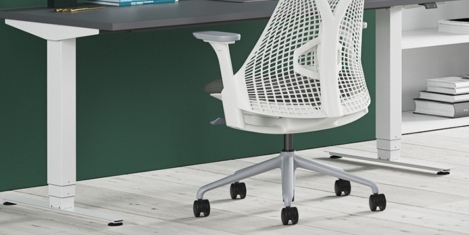To provide the best experiences, we use technologies like cookies to store and/or access device information. Consenting to these technologies will allow us to process data such as browsing behaviour or unique IDs on this site. Not consenting or withdrawing consent, may adversely affect certain features and functions.
The technical storage or access is strictly necessary for the legitimate purpose of enabling the use of a specific service explicitly requested by the subscriber or user, or for the sole purpose of carrying out the transmission of a communication over an electronic communications network.
The technical storage or access is necessary for the legitimate purpose of storing preferences that are not requested by the subscriber or user.
The technical storage or access that is used exclusively for statistical purposes.
The technical storage or access that is used exclusively for anonymous statistical purposes. Without a subpoena, voluntary compliance on the part of your Internet Service Provider, or additional records from a third party, information stored or retrieved for this purpose alone cannot usually be used to identify you.
The technical storage or access is required to create user profiles to send advertising, or to track the user on a website or across several websites for similar marketing purposes.
 Workers are leaving jobs like never before, and it’s causing a shortage of talent that has companies around the globe reeling, according to a survey conducted by Citrix Systems. Based on a poll of 1,000 US based knowledge workers, 40 percent have left at least one job in the past year or are considering doing so. The report from the firm sets out the factors behind the so-called Great Resignation and what firms may have to do in response. (more…)
Workers are leaving jobs like never before, and it’s causing a shortage of talent that has companies around the globe reeling, according to a survey conducted by Citrix Systems. Based on a poll of 1,000 US based knowledge workers, 40 percent have left at least one job in the past year or are considering doing so. The report from the firm sets out the factors behind the so-called Great Resignation and what firms may have to do in response. (more…)







 A new study from researchers at University College London claims that the journey to work has benefits for people’s mental health, fitness levels and work-life balance. According to the study into attitudes to commuting led by neuroscientist
A new study from researchers at University College London claims that the journey to work has benefits for people’s mental health, fitness levels and work-life balance. According to the study into attitudes to commuting led by neuroscientist 
 More than eight in 10 (83 percent) UK businesses say hybrid working increases the risk of a data breach, yet over a fifth (22 percent) remain unprepared if it happens, with speed of response the top concern. According to new research published within TransUnion’s Data Breach Support for Businesses
More than eight in 10 (83 percent) UK businesses say hybrid working increases the risk of a data breach, yet over a fifth (22 percent) remain unprepared if it happens, with speed of response the top concern. According to new research published within TransUnion’s Data Breach Support for Businesses 


 New World Health Organization (WHO)
New World Health Organization (WHO) 
 The CIPD has welcomed a new consultation from the UK Government on making flexible working requests a day one right. The CIPD launched its #FlexFrom1st campaign in February, calling for all employees to have the immediate right to request flexible working. Under the proposed legislation, companies would be obliged to explain their reasons if it is then refused. The plan would also oblige employers to respond to such requests more quickly, and is being billed as a major reshaping of the way people work in a post-pandemic world, making flexible work the default.
The CIPD has welcomed a new consultation from the UK Government on making flexible working requests a day one right. The CIPD launched its #FlexFrom1st campaign in February, calling for all employees to have the immediate right to request flexible working. Under the proposed legislation, companies would be obliged to explain their reasons if it is then refused. The plan would also oblige employers to respond to such requests more quickly, and is being billed as a major reshaping of the way people work in a post-pandemic world, making flexible work the default. 
 New ways of working will boost UK productivity and increase employment levels in cities outside of London, according to a new report from KPMG. And as businesses in some sectors prepare for employees to spend two to three days a week working from home on a permanent basis, demand for office space could see capacity potentially increase by as much as 40 percent, according to a new KPMG report,
New ways of working will boost UK productivity and increase employment levels in cities outside of London, according to a new report from KPMG. And as businesses in some sectors prepare for employees to spend two to three days a week working from home on a permanent basis, demand for office space could see capacity potentially increase by as much as 40 percent, according to a new KPMG report, 
 Disruption, cost, building style, individual goals, responsibility and shared space are cited as the key sustainability challenges for the flexible office sector, according to the
Disruption, cost, building style, individual goals, responsibility and shared space are cited as the key sustainability challenges for the flexible office sector, according to the 
 Following the sobering message from the
Following the sobering message from the 
 As businesses in the UK prepare to open their office doors en masse in the first week of September, new research reveals that office workers have got that back-to-school excitement and are feeling largely positive about the transition. Recruitment firm Michael Page questioned over 2,000 UK office workers on their attitudes to returning to the office and found that after eighteen months at home, around half claim to be ‘excited’ or ‘happy’ to spend more time in the office with their colleagues. Reminiscent of the first day back at school, almost three in ten (28 percent) said that they had picked out their outfit and packed their bag ahead of their first day back in the office.
As businesses in the UK prepare to open their office doors en masse in the first week of September, new research reveals that office workers have got that back-to-school excitement and are feeling largely positive about the transition. Recruitment firm Michael Page questioned over 2,000 UK office workers on their attitudes to returning to the office and found that after eighteen months at home, around half claim to be ‘excited’ or ‘happy’ to spend more time in the office with their colleagues. Reminiscent of the first day back at school, almost three in ten (28 percent) said that they had picked out their outfit and packed their bag ahead of their first day back in the office. 
 CEOs of the world’s largest businesses are increasingly optimistic about the outlook for their own business, according to the latest
CEOs of the world’s largest businesses are increasingly optimistic about the outlook for their own business, according to the latest 
 With a large number of firms now prepared to embrace a ‘hybrid working’ model, business leaders remain uncertain about how this may play out in practice according to a new report from Entrust called
With a large number of firms now prepared to embrace a ‘hybrid working’ model, business leaders remain uncertain about how this may play out in practice according to a new report from Entrust called 







